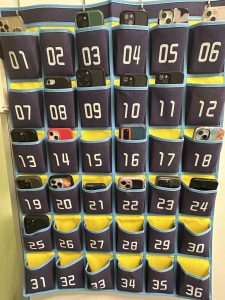
I’ve never been a person who is truly attached to my phone. I will say that I prefer having my phone within my reach at home to see the notifications coming in, that way I can easily ignore them. Not knowing what I’m receiving, or not receiving, distracts my focus.I won’t deny that I haven’t had moments of scrolling instead of doing homework, but I don’t find it difficult to just put on music and crank out my work. But others may not be able to do that.
Therefore, within the school environment, phones should be utilized to teach responsibility, trust and self-discipline instead of being treated as distractions.
Phones can be used as an instructional tool, and since they are already so integrated into society, should be capitalized on by the school system. According to a study completed by Matthew Crisp, who holds a Ph. D. in Education from The Ohio State University, “The emerging use of portable digital devices by students, parents and teachers, is forcing schools to develop real-time communication systems that integrate technology into the general operations of schools, and contemplate governing policies and procedures to sustain and guide the challenges of these new technologies.”
By finding positive uses, students and teachers can develop a bond of trust and respect for each other’s time. Students are very impressionable by the role models in their life. When teachers are allowed to scroll on their phones during work time, but students aren’t allowed to use theirs to simply listen to music, it creates uneven standards.
Disruptions in the classroom will happen either way, with or without phone usage. After addressing that phones are no more of a distraction than tapping or pen clicking, “We now have more time to focus on what matters: teaching and learning,” according to Illinois principal Scott Herman, published in Among Colleagues magazine.
Some may say that students can use their Chromebooks for music (which many students do use for focus during work time); however, many music applications are blocked. In addition, Chromebooks can also be as much of a distraction as phones. Students can play games that they find on their Chromebooks, or they can focus on work for other classes instead of what they should be doing.
I have heard my teachers tell my classes of seniors that we are “almost adults” and that we should act like it. Yet the current policy results in us being treated like children.
According to research published in the International Journal of Emerging Technologies in Learning, “Other lecturers do not put rules for the use of mobile phones during lectures, yet it has been found within the survey that students pass these courses and get high grades.”
Despite the controversy of phone usage in schools, many believe that it can be beneficial. From teaching responsibility to creating more trust, the improvements could push over current obstacles in the classroom.


